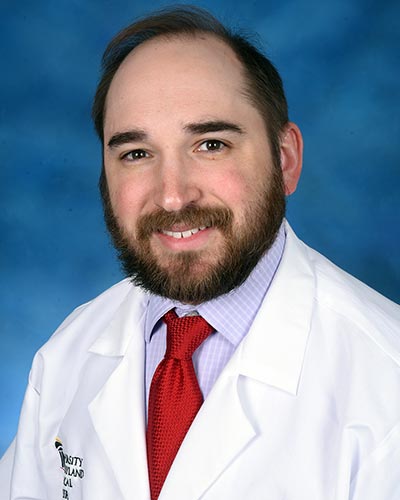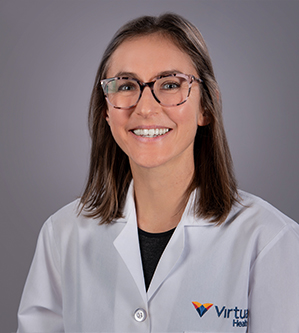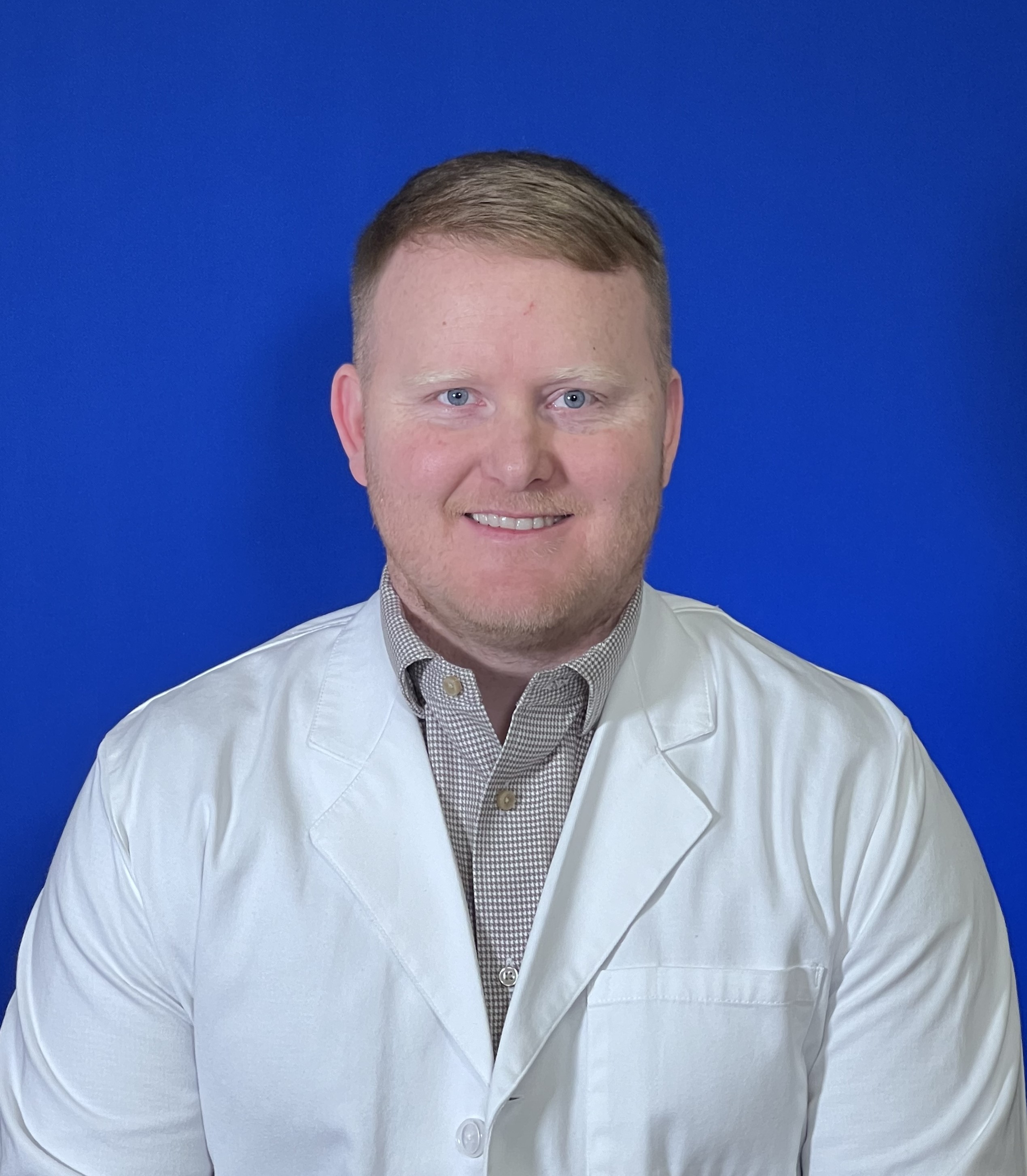Testimonials

Fellowship Alumni Class of 2024
Matthew R. Woodward, DO
University of Maryland Medical Center
Baltimore, MD
After completing my neurology residency at the University of Maryland, the choice to stay for fellowship was obvious. I wanted to gain deep clinical knowledge of critical care through rigorous training and gain research training and experience toward my goal of becoming a physician-scientist. The neurocritical care fellowship at the University of Maryland/Shock Trauma Center delivered.
Both the variety and severity of pathology encountered at the University of Maryland/STC is incomparable. I have learned to care for profoundly sick and complex patients in the neurocritical care unit, as well as in the medical, surgical, and trauma ICUs as an integral part of the medical team. Integrating this multi-disciplinary critical care training has made me a better clinician and built connections to a wider community of intensivists. As a trainee interested in research, I was supported by the fellowship and the division to compete for and receive an NIH training grant and then adapt my clinical training to be able to complete a Masters in Epidemiology and Clinical Research. What stands out to me most about the program here at University of Maryland is the individualized mentorship and training I have received from the faculty which has allowed me to grow as a researcher, clinician, and educator. I am thrilled to be able to stay on as faculty after completing fellowship and continue to work with the faculty who trained me!

Fellowship Alumni Class of 2023
Vanessa Salasky, MD
New Jersey
I completed my neurology residency at the University of Maryland. I decided to stay for a fellowship because I knew I would receive great training under fantastic attendings while caring for the sickest patient population. The clinical and didactic experience provided solid training not just in neurocritical care but across many other ICUs including medical, surgical, and cardiac. The volume of neurotrauma at Shock Trauma is unparalleled and a truly unique opportunity to learn from critical care attendings from many different disciplines. The faculty were immensely supportive of fellows’ research pursuits. I have a strong interest in global health and was able to travel back to Zambia during my fellowship to perform another clinical and research elective. The University of Maryland Medical Center/Shock Trauma fellowship was challenging and rigorous and prepared me well to practice independently.

Fellowship Alumni Class of 2022
William (Denney) Zimmerman, DO
Blount Memorial
Maryville, TN
When I was interviewing and choosing a fellowship in Neurocritical care, I wanted a place that would transform myself into a great, well-rounded intensivist. I loved my neurology training at Georgetown University Hospital in Washington, DC, but most of all I loved the collegiality and empathy I had grown accustomed to there during my residency. UMMC/STC built on this experience and provided the absolute best atmosphere to learn, build procedural skills, develop research interests, and work amongst some of the most compassionate and supportive faculty in this country and internationally. The exposure to a large range of disease processes in critical care is unparalleled. You are not only a neurocritical care fellow during your two years, but also a SICU, MICU, and CSICU fellow amongst others, and learn to treat and care for the sickest patients in all specialties. This place offers an extremely large cohort of medical education in critical care, with a growing group of faculty with extensive research experience and mentorship. With two fellows per year, growth and expertise are encouraged very early on in your training and allow the development of a strong foundation. The most important aspect of my two years were the people whom I worked with closely, especially my co-fellows, who are now my colleagues at this amazing academic institution, and though biased produce exceptional neuro intensivists.

Fellowship Alumni Class of 2021
Melissa Pergakis, MD
University of Maryland Medical Center
Baltimore, MD
After completing a clinically demanding neurology residency, I was looking for a fellowship program that would allow me to build upon the knowledge and skills that I had gained during residency. After finishing the fellowship, I cannot imagine training at a place other than UMMC/STC. The program is unmatched with the training that fellows receive in becoming well-rounded intensivists who specialize in treating patients with neurologic disease. Though daunting, my rotations in other ICUs as the primary fellow established the foundation that I needed to become an intensivist. Additionally, the tremendous volume, high acuity, and breadth of patients with neurologic disease in the neuro ICU allowed me to hone my practice as a neurointensivist. The dedication of the faculty to the education and development of the fellows made me feel as though my training was tailored to my needs and goals. Despite the clinical demands of the program, there is a strong focus and ample mentorship for becoming a clinician-scientist. UMMC/STC was such a phenomenal place to train for fellowship that I decided and felt grateful to be able to stay on as faculty.

Fellowship Alumni Class of 2021
Brittany Lachance, DO
Maine Medical Center
Portland, ME
The Neurocritical Care Fellowship at the University of Maryland/Shock Trauma was one of the most challenging tasks I've ever taken on, but I would not have traded it for anything. You only have two years to prepare for critical care attendingship, and in my opinion anything less than a true challenge is not going to cut it. Throughout my time at UMMC I felt the perfect balance of being pushed to my limits and supported through the learning process of stepping into the critical care unit. The opportunity to be the primary fellow in every ICU allows for full immersion into the critical care specialties, and I've come out the other side feeling ready to step into the leadership role of a multidisciplinary critical care team. In addition to the critical care and procedural experience, I feel fortunate to have had the mentorship of leaders in our field, and my fellowship was very productive in terms of beginning an academic career and achieving publication thanks to their guidance. I am so thankful to everyone who taught me throughout fellowship, and I'd pick UMMC/Shock Trauma over again in a heartbeat.

Fellowship Alumni Class of 2020
Jamie Podell, MD
University of Maryland Medical Center
Baltimore, MD
I could not be happier with my decision to train at Maryland for neurocritical care fellowship. I liked it so much that I decided to stay and was lucky to get a faculty position here. After completing residency at Penn, I was looking for a program that would build on my neurology background to make me a well-rounded intensivist capable of managing multisystemic issues, while also helping me achieve my goal to become a clinician-scientist with a particular interest in TBI. Maryland did exactly that. I doubt that there are any ICUs in the country with sicker patients, both in the neurosciences and neurotrauma units and in the other medical and surgical units where you act as primary fellow. It is an exciting place to train, where you really learn by experience (and awesome interdisciplinary formal critical care education!). With a small, collaborative and academically-minded core faculty and small number of fellows per year, I also felt like I got the personal attention and support I needed to succeed clinically and academically. And of course, the TBI volume and extent of physiologic monitoring at Shock Trauma is unparalleled - research opportunities abound. I hope to meet you along the virtual interview trail!

Fellowship Alumni Class of 2020
Matthew Jaffa, DO
Hartford Hospital
Hartford, CT
When the time came to choose where to continue my training after residency there was simply no choice aside from UMMC/STC. After having completed Neurology residency in the same institution and searching other programs for a fit I quickly realized that none would come close to matching the quality of training or depth of knowledge that could be attained here. Not only will you be exposed to all facets of critical care but you will take the lead in every ICU that you rotate through, learning from and teaching fellows from all training backgrounds. Faculty mentors are. second to none and encourage each fellow to find their clinical niche and research interests starting on day one. My experiences at UMMC/STC have provided a strong foundation from which to start as an attending.

Fellowship Alumni Class of 2019
Kristina Lim-Hing, MD
Northwell Health
Bay Shore, NY
Neurocritical Care fellowships come in a wide variety of programs. After completing a strong clinical neurology residency, I knew I wanted a well-rounded critical care foundation to supplement. That is exactly what I found in fellowship at UMMC/STC. In comparing my training to that of other programs, hands-on clinical exposure is unparalleled. I graduated fellowship with the confidence to lead a neurocritical care team while having the experience in general critical care to tackle medical issues outside of neurology.

Fellowship Alumni Class of 2019
Nikhil Patel, MD, MBA
Carolinas Medical Center
Charlotte, NC
Training at UMMC for both my residency in Neurology and fellowship in Neurocritical Care provided me with a well-rounded education and apprenticeship to build a strong foundation to the start of my career. I really appreciated how quickly the faculty took me under their wing when I expressed an interest in critical care during residency. They helped me develop my interests and always provided support in enhancing my clinical and research acumen.
I also loved being able to learn from experts in so many critical care subspecialties, from trauma intensive care to cardiac surgery intensive care, an experience that is quite unique to training at Maryland. I knew I had received world-class training when I started my first attending gig and realized how seamless the transition was. It is a wonderful place to train!

Fellowship Alumni Class of 2018
Ram Gowda, MD
Rutgers Health
New Brunswick, NJ
This place is a critical care community: practitioners from many disciplines passionate about treating the sickest patients. The emphasis is on training you to be an intensivist with a special focus on the neurologic patient. Instead of playing tourist in other ICUs, you will learn to take charge alongside fellows from other specialties. And when you return to the neuro-ICU, you will not feel relief at escaping unfamiliar environments but excitement to apply newly gained knowledge to the care of your patients. Make no mistake: the learning curve is steep. But the faculty are eager to train you, and your colleagues in other specialties will teach you and in turn learn from you. I could feel myself grow in confidence and proficiency every week of fellowship--something I took with me when I became an attending at a new institution.

Fellowship Alumni Class of 2018
Masoom Desai, MD
University of Oklahoma Health Science Center
Oklahoma City, Oklahoma
UMMC/STC Neurocritical Care Fellowship provided me a career-defining perspective on critical care medicine. The clinical training at UMMC/STC is unparalleled to any other institution in the country with multi-dimensional exposure to all aspects of critical care. I cherish all the invaluable insights and pearls gained from my fellowship training even today as a faculty. I am an Assistant Professor at OUHSC, Department of Neurology with a dual role in the division of Critical Care Neurology and Neurophysiology/Epilepsy.

Fellowship Alumni Class of 2017
Imad Khan, MD
University of Rochester Medical Center
Rochester, NY
Neurocritical care training at UMMC/STC was a defining moment in my career because it instilled upon me the knowledge, instincts, and values of a pan-disciplinary intensivist. Maryland gave me everything I was looking for in a training program: aspirational mentors, unforgettable clinical experience, boundless research collaboration, and a top-notch didactic curriculum.
Updates: Our research collaboration won a University Research Award from the University of Rochester to combine diffuse correlation spectroscopy, quantitative EEG, transcranial doppler, and auditory brainstem response to create a non-invasive, multimodal neuromonitoring paradigm for adults undergoing ECMO for cardiac arrest and shock.
